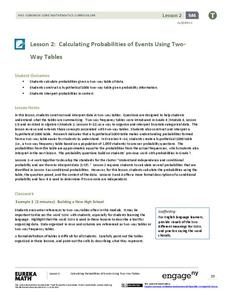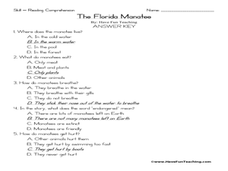EngageNY
Calculating Probabilities of Events Using Two-Way Tables
Tables are useful for more than just eating. Learners use tables to organize data and calculate probabilities and conditional probabilities.
Columbus City Schools
Experiencing Eclipses
Don't be caught in the dark! Young scientists investigate the causes of both solar and lunar eclipses using an interactive to help them understand the development of an eclipse over time. They then research facts and characteristics of...
PBS
Harriet Beecher Stowe: Author and Abolitionist
Scholars use primary documents, video clips, and legal decisions to uncover Harriet Beecher Stowe's motives for writing Uncle Tom's Cabin. They create a 21st century book jacket for the novel to capture the purpose behind Stowe's story.
PBS
Harriet Tubman: Abolition Activist
Imagine breaking out of prison only to continue to go back in to get others out. Welcome to the life of Harriet Tubman. Scholars research her amazing life and her impact on abolition in the United States. Using primary and secondary...
PBS
Henry David Thoreau: Author, Philosopher, and Abolitionist
What would Henry David Thoreau think of life in 21st-Century America? Pupils investigate the abolitionist using primary and secondary materials. They analyze what Thoreau would think of the changes to American lifestyles since the time...
PBS
Elizabeth Cady Stanton: Orator, Author, and Activist
Have you ever felt like your opinion doesn't count? Scholars research and analyze the impact Elizabeth Cady Stanton had on women's rights. Primary and secondary sources as well as video clips give individuals a clear picture of Stanton's...
PBS
Walt Whitman: Journalist and Poet
Can you love something so much you want to change it? Young patriots investigate Walt Whitman's love of America—and his suggestions to improve it—using primary sources as well as video evidence. Scholars research American issues of the...
PBS
Mark Twain: Storyteller, Novelist, and Humorist
Scholars investigate the use of satire in Mark Twain's writing. Literary lovers research the Adventures of Huckleberry Finn and Tom Sawyer, political cartoons, and videos to see how Twain uses satire to make the stories more memorable....
Council for Economic Education
Mercantilists and the Midas Touch
What is the connection between greed and mercantilism? Historians consider this question by analyzing a fairy-tale like story about King Midas from the nineteenth century. The background information and excerpt help pupils understand the...
Judicial Learning Center
Levels of the Federal Courts
The Supreme Court gets all the glory, but very few federal cases make it to the highest court. An interesting lesson explores the structure of the lower levels of the federal court system. In addition to outlining the organization of...
PBS
Symbolism and the Use of “New Language” in The Handmaid’s Tale
Words matter. Words frame thought. Words are symbolic. Readers of Margaret Atwood's The Handmaid's Tale examine how the words In Gilead's "New Language" reinforce the power of the government and provided insight into the symbolic level...
American Chemical Society
The Periodic Table and Transuranium Elements
The periodic table has so much more to it than meets the uninformed eye. An inquiry-based lesson leads learners through the history of the discovery of several transuranium elements. They then use informational resources to build a...
Curated OER
Which Baby Animals Looks Unlike Their Parents?
Learners review the steps of the butterfly life cycle to show how the babies are different from the parents. This learning exercise is a graphic organizer with four fill in the blank statements.
Curated OER
The Florida Manatee: Reading Comprehension
Five multiple choice questions test early readers on their understanding of a one-page passage on the Florida Manatee. Answers on page 3.
Curated OER
Wuthering Heights: Questioning Strategy
Readers of Wuthering Heights use the DRTA strategy to formulate predictions about the actions of characters in Bronte's novel.
Curated OER
Introducing Literary Elements in Fiction
Identify literary elements in fiction. In this reading comprehension lesson plan, learners read the book Pigsty and record literary elements onto a graphic organizer. They specifically discuss the main characters and events in the text.
Curated OER
Persuasive Elements
Investigate letters to the editor and their persuasive qualities. Break your class into reading groups and give each one a different article. As they read, they complete a graphic organizer to record their thoughts and opinions. There is...
Curated OER
Text Features of a Story
Bring the enjoyable story of Anansi and the Moss-Covered Rock by Eric A. Kimmel to your young readers. After reading the story as a class, students answer questions about a reading and make a graphic organizer. They make predictions,...
Curated OER
Story Web
Use a graphic organizer or story web to show the relationship between plot and character. They note the setting, characters, title, author, conflict, and solution regarding short story or novel they have read.
Curated OER
Paragraphs: Main Idea and Supporting Details
This is a great way to review the concept of main idea and supporting details with younger learners. Learners read two short passages and identify the main idea and supporting details using visual prompts and a graphic organizer.
Curated OER
USA Today: Global Awareness Edition
Bring global awareness into the classroom. Young politically minded learners read an article about the ban on arms sales to China and discuss political concerns about this issue. They research other embargos on foreign trade and use a...
Curated OER
Descriptive Writing: Parrot in the Oven
After reading a selection from Victor Martinez's Parrot in the Oven, pupils use the graphic organizer to decipher the sensory details within the descriptive paragraph. They list various details under the appropriate sense ("see," "hear,"...
Curated OER
Story Elements
Review story elements with your class using this resource. Learners can take a story they have read as a class and identify story elements. They focus on characters, setting, the introduction, and plot. Then, they use graphic organizers...
Curated OER
Fahrenheit 451: KWHL Strategy
Turn your readers into "examiners, critics, knowers, and imaginative creators," with a KWHL strategy designed for Fahrenheit 451. Individuals fill out a KWHL graphic organizer about censorship and then share responses with a group. The...

























